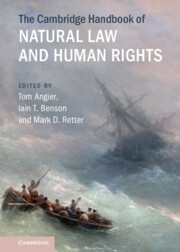Book contents
- The Cambridge Handbook of Natural Law and Human Rights
- The Cambridge Handbook of Natural Law and Human Rights
- Copyright page
- Contents
- Contributors
- Acknowledgements
- Introduction
- Part I Natural Law and the Origins of Human Rights
- 2 Natural Law and Human Rights
- 3 The Paradox of Shrinking Individuality
- 4 Synderesis, Conscientia, and Human Rights
- 5 The Case against the Marriage of Natural Law and Natural Rights
- 6 The Mythical Connection between Natural Law and the Universal Declaration of Human Rights
- 7 Natural Law and the Universal Declaration of Human Rights
- Part II Natural Law Foundations of Human Rights Obligations
- Part III Natural Law and Human Rights within Religious Traditions
- Part IV The Human Person, Political Community, and Rule of Law
- Part V Rival Interpretations and Interpretive Principles
- Part VI Challenges and Future Prospects
- Index
3 - The Paradox of Shrinking Individuality
Natural Rights’ Development and Relevance to Human Rights Today
from Part I - Natural Law and the Origins of Human Rights
Published online by Cambridge University Press: 03 November 2022
- The Cambridge Handbook of Natural Law and Human Rights
- The Cambridge Handbook of Natural Law and Human Rights
- Copyright page
- Contents
- Contributors
- Acknowledgements
- Introduction
- Part I Natural Law and the Origins of Human Rights
- 2 Natural Law and Human Rights
- 3 The Paradox of Shrinking Individuality
- 4 Synderesis, Conscientia, and Human Rights
- 5 The Case against the Marriage of Natural Law and Natural Rights
- 6 The Mythical Connection between Natural Law and the Universal Declaration of Human Rights
- 7 Natural Law and the Universal Declaration of Human Rights
- Part II Natural Law Foundations of Human Rights Obligations
- Part III Natural Law and Human Rights within Religious Traditions
- Part IV The Human Person, Political Community, and Rule of Law
- Part V Rival Interpretations and Interpretive Principles
- Part VI Challenges and Future Prospects
- Index
Summary
This chapter examines the earliest natural rights theories in order to analyse philosophical connections between natural and human rights, concerning: scepticism, metaphysical dualism, and the authority of rights. First, the chapter studies Albert the Great’s principles of right and how he understood nature to be reason. Next, analysis of the main tenets of Henry of Ghent’s metaphysics, and his exposition of the soul’s property over one’s body, show that Neoplatonist dualism was fundamental in the development of the first natural rights theories. The philosophical solution to the poverty controversy, of human beings’ natural rights to use material goods, that Hervaeus Natalis proposed became the law of the Church when the Pope incorporate it in the bull, Cum inter nonnullos (1323). Hervaeus continued the metaphysical dualism of Henry and argued that natural rights endowed reality with normativity and hence authority. The chapter concludes by relating this intellectual history to contemporary rights theories. Natural and human rights are identified as a form of public reason that sometimes assists, other times substitutes for, individual right reason and judgement about morality.
Keywords
- Type
- Chapter
- Information
- The Cambridge Handbook of Natural Law and Human Rights , pp. 45 - 60Publisher: Cambridge University PressPrint publication year: 2022



